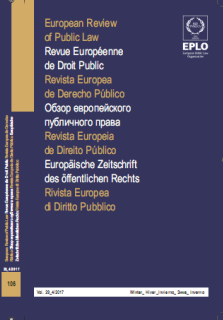
Administrative Law / Droit administratif
Serbia / Serbie
Lecturer at the University of Belgrade, Faculty of Law, Serbia, bojana.todorovic@ius.bg.ac.rs
The Republic of Serbia has been conducting an ambitious and thorough public administration reform in order to respond to challenges brought about by changes on several fronts - economic, social and technological - as well as the ones arising out of the European integration process. The flagship of that reform is the new systemic law on general administrative procedure (GAPA). The new GAPA was adopted in 2016, but its full enforcement had been delayed until 1 June 2017, in order to enable the public administration to prepare for the new rules of administrative procedure (some of which are significantly different from the 1997 GAPA) and to allow citizens and businesses to get informed about their procedural rights vis-à-vis the administrative authorities. The main novelties aim at improving the quality and expediency of administrative proceedings, enhancing legal certainty and transparency, strengthening the rule of law and further harmonization with the EU acquis. The author gives an overview of the most notable changes introduced to this end and concludes that the true test of GAPA’s success lies in its adequate implementation, which will depend on education and training of both the administration and the citizens, in addition to a controlled and well-coordinated harmonization of special policy laws with the GAPA.
La République serbe a mené une réforme ambitieuse et complète de l’administration publique afin de répondre aux défis résultant des changements intervenus sur plusieurs fronts - économique, social et technologique - ainsi qu’à ceux nés du processus d’intégration européenne. La réforme phare est la nouvelle loi systémique sur la procédure administrative générale (GAPA). La nouvelle GAPA a été adoptée en 2016 mais son entière application a été retardée jusqu’au 1er juin 2017 afin de laisser le temps à l’administration publique de se préparer aux nouvelles règles de procédure administrative (dont certaines diffèrent substantiellement de la GAPA de 1997) et de permettre aux citoyens et aux entreprises de s’informer sur leurs droits procéduraux vis-à-vis des autorités administratives. Les principales nouveautés visent à améliorer la qualité et la rapidité des procédures administratives, à renforcer la sécurité juridique et la transparence, à consolider l’Etat de droit et à favoriser l’harmonisation avec l’acquis communautaire. L’auteur donne un aperçu des changements les plus notables introduits à cette fin et conclut que le véritable test du succès de la GAPA réside dans son application adéquate, qui dépendra de l’éducation et de l’entraînement à la fois de l’administration et des citoyens, en plus d’une harmonisation contrôlée et bien coordonnée des lois de politique spéciale avec la GAPA.





















